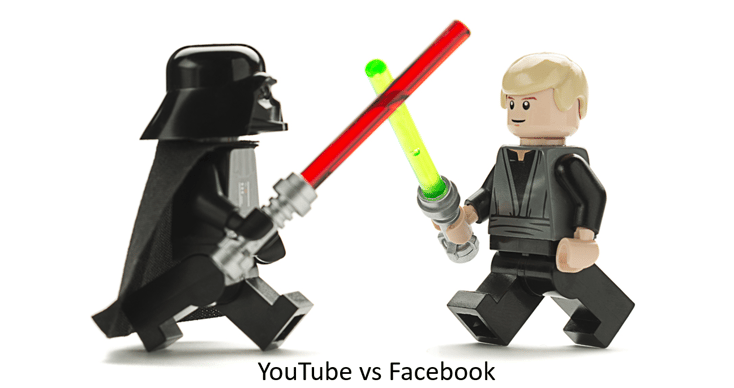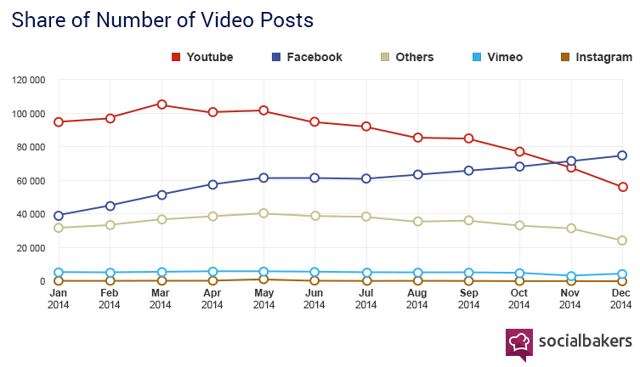
A long time ago, in a marketing galaxy not so far away...
All was peaceful on planet YouTube. WIth backing from the powerful Google Empire, YouTube had staked out a position as the galaxy's second-largest search engine . But in the nearby Facebook system, a plan to unseat YouTube from its reign as the most popular video marketing channel was brewing. Lead by the cunning General Zuckerberg, Facebook mounted an attack on YouTube's video popularity and was able to overtake it with more videos being uploaded directly to Facebook than shared with Youtube in the winter of 2014. But YouTube would not go quietly, and prepared to launch a counterattack.
The Video Marketing Wars had begun...

Maybe that's not exactly how it went, but I imagine that the struggle for power in video marketing translated into the Star Wars universe might look a little something like that. Either way you look at it, the fight for control over video marketing platforms is an epic story when you consider how effective videos are. 7 out of 10 marketers say videos convert better than any other medium, and average web surfers spend 88% more time on a page if it has video on it.
The video "war" has been raging for a while and will most likely continue to do so. But the real takeaway for B2B marketers isn't the fact that major social media platforms are fighting over video, it's why they are fighting over video: its reach and ability to influence action with very specific groups of people.
Why the big struggle? The power of video

There are three key reasons that big names in media like Facebook and YouTube are going after a larger share of the video market:
1. Reach - YouTube is the second-largest search engine. Nearly one out of every three people on the Internet are YouTube users - that's a pretty big audience.
2. Ability to target - Networks that offer video advertising solutions have access to more data than ever: your age, gender, what type of movies you like, what brands you purchase from...etc. The more targeted videos are, the more attention they'll attract, which is why Facebook is killing it when it comes to video engagement - during the holidays, it's not uncommon for Facebook to receive 80% of all video interactions on the web. No matter where they are, videos that are well-aligned with buyer personas are guaranteed to perform better.
3. Compatibility with mobile - You already know how important mobile is for digital marketing (at least I hope you do!) Google proved that with the recent Mobilegeddon update. Video and marketing are like Jordan and Pippen, Magic and Kareem, Starsky and Hutch...you get the picture - they're a great team. 40% of all YouTube video views are on mobile, and millennials tend to devote their undivided attention to videos on their smartphones.
Both brands know that if they can push marketers to use video advertising on their networks, momentum will start to swing their way, like a snowball rolling downhill in a blizzard that eventually knocks out the other platforms and ensures galactic domination in video.
Ok...but what does this have to do with me?
Truthfully, no matter who wins the war for domination in video - brand marketers are the real winners. Both networks will be doing everything they can to make your video marketing campaigns as successful as possible - the only way you lose is to not play the game.
But if you want to climb up to the top rope and proudly wave the video marketing championship belt in front of thousands of adoring fans, you need a video marketing plan.
We all know how expensive and time consuming it is to create video content for your marketing initiatives - so my agency partners and I have been hard at work creating a scaleable video marketing solutoin that helps companies create more video assets with less money and time.
If your applying video to your marketing efforts, lets do a quick sanity check to see if this unique approach is right for you.





